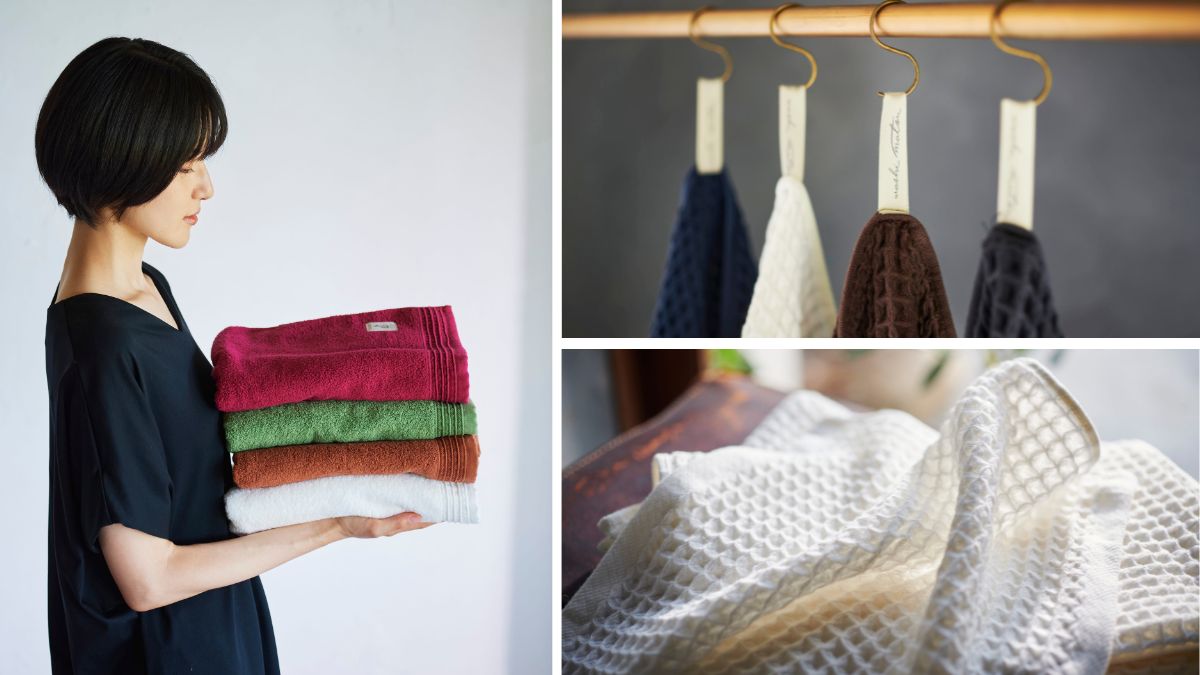
Brand
Japan's SDGs for the world
FUKUROYA TOWEL
- 1926
- SENSHU TOWEL
- Kenji Fukuroya

History
Birthplace of Japan's first towel since the Edo period
Fukuroya Towel is a Senshu towel company located in Izumisano City, Osaka Prefecture, founded in 1926.
The Senshu area in southern Osaka has been a center of cotton cultivation and white cotton production since the Edo period (1603-1868).
At that time, tenugui (towels) and yukata (light cotton kimono) were highly regarded for their superior whiteness.
In 1887, Mr.Enjiro Satoi, a cotton manufacturer in Izumisano City, improved the loom for white cotton and the first towel in Japan was born.
Senshu towels quickly gained a reputation for their softness, warmth and breathability.
In the early 1900s, Senshu towels were called the "Manchester of the East" in reference to Manchester, England, the world's largest spinning and manufacturing city.
In such an area, since its founding by the first generation Tsunekichi, Fukuroya Towel has continued to make towels with passion and diligence.
Seijiro, the second generation, established the company and continued to manufacture and sell towels domestically and internationally.
Seiichiro, the third generation, developed Fukuro-ori, which made it possible to produce towels with names on them, and the demand for towels with company or store names woven into them increased.
The fourth generation, Noboru, realized fast delivery and small batch production through computerization.
He was highly regarded for developing towels using local resources.
Today, Kenji, the fifth generation, is carrying on this tradition while striving to anticipate the changes of the times, meet the diversifying needs of customers, and deliver better products.

Characteristic
People- and eco-friendly, naturally derived towels
Senshu towels are characterized by the post-bleaching process, which involves refining and bleaching after weaving.
In the bleaching process, the glue and wax used to strengthen the cotton threads, as well as the oil and impurities that originally adhered to them, are removed by washing in water to make the towels clean.
Since its birth in 1887, Senshu Towel has consistently insisted on post-bleaching to provide safe and secure towels.
In addition, the post-bleaching process brings out the water absorbency and uniquely soft texture of cotton yarns, and brightens the colors of the post-dyeing process.
In addition to comfort, Fukurodani Towel has always pursued manufacturing that meets the needs of the times.
Today, when the realization of a sustainable society has long been called for, we felt that it was imperative to make towels that could be produced without polluting the environment while utilizing local resources.
Therefore, we decided to use the lees left after brewing Osaka wine and local beer, as well as vegetables grown in Osaka that could not be sold due to their bad shape or that were no longer needed and had to be thrown away, as dyes.
The towels created through the collaboration of Osaka producers were highly acclaimed and even offered at the G20.

For Customers
Making familiar objects sustainable
These towels are made with the hope that the spirit of "MOTTAINAI" will be incorporated into our daily lives in a fun way, and that the world will become a place where producers can connect with each other and with users.
In addition to the high quality of absorbency and softness, we offer a wide range of products, from natural products that reproduce the colors of nature as they are, to products that pursue deeper colors that are one step higher.
"Can you guess what the color of this towel came from?"
Just having one of these products in your possession is a conversation starter, and you may even be noticed as a gift.
We hope you will pick up one of our towels filled with the blessings of nature.
Award
2014 Adopted for Monozukuri subsidy
2015 Adopted for Regional Creation Fund
2016 Adopted for Osaka Design Innovation Creation Competition DIMO Project adopted
2016 Adopted for Innovative Manufacturing Subsidy
2018 Osaka Made Brand certification
2018 Certified as a Business Plan for Utilization of Regional Industrial Resources
![[ผ้าเช็ดตัว] ผ้าเช็ดตัว "Shizuku" Senshu Towel | ผ้าขนหนูฟูคุโรย่า](http://en.thebecos.com/cdn/shop/files/s0257-019-1_45ae4611-c81e-4f28-8ee4-4d937ba9d1f5_{width}x.jpg?v=1732350025)
![[ผ้าเช็ดตัว] ผ้าเช็ดตัว "Shizuku" Senshu Towel | ผ้าขนหนูฟูคุโรย่า](http://en.thebecos.com/cdn/shop/files/s0257-019-2_28572677-8f37-483d-a0ec-3de16e8966b1_{width}x.jpg?v=1732350029)
![[ผ้าเช็ดตัว] ผ้าเช็ดหน้า "Shizuku" (ประเภทผ้าขนหนู) | Senshu Towel | ผ้าขนหนูฟูคุโรย่า](http://en.thebecos.com/cdn/shop/files/s0257-035-1_a85fa3d0-3034-46d4-879e-34e1d0987fb4_{width}x.jpg?v=1732350210)
![[ผ้าเช็ดตัว] ผ้าเช็ดหน้า "Shizuku" (ประเภทผ้าขนหนู) | Senshu Towel | ผ้าขนหนูฟูคุโรย่า](http://en.thebecos.com/cdn/shop/files/s0257-035-2_b9f71f75-6f1e-4f7d-9974-6049d8229bc1_{width}x.jpg?v=1732350213)
![[ผ้าเช็ดตัว] "แม่ลายญี่ปุ่น" การออกแบบกัญชาดาวอาบน้ำผ้าเช็ดตัว | Senshu Towel | ผ้าขนหนูฟูคุโรย่า](http://en.thebecos.com/cdn/shop/files/s0257-012-1_8672a8b0-dc06-40b4-b53d-0a4550615711_{width}x.jpg?v=1732349655)
![[ผ้าเช็ดตัว] "แม่ลายญี่ปุ่น" การออกแบบกัญชาดาวอาบน้ำผ้าเช็ดตัว | Senshu Towel | ผ้าขนหนูฟูคุโรย่า](http://en.thebecos.com/cdn/shop/files/s0257-012-2_9631aabf-e19d-428b-a73c-5b1727fa7296_{width}x.jpg?v=1732349659)
![[ผ้าเช็ดตัว] "แม่ลายญี่ปุ่น" เต่าเต่าออกแบบผ้าเช็ดตัว Senshu Towel | ผ้าขนหนูฟูคุโรย่า](http://en.thebecos.com/cdn/shop/files/s0257-011-3_d17ff561-1d5e-43c2-a496-e3afe927e648_{width}x.jpg?v=1732349909)
![[ผ้าเช็ดตัว] "แม่ลายญี่ปุ่น" เต่าเต่าออกแบบผ้าเช็ดตัว Senshu Towel | ผ้าขนหนูฟูคุโรย่า](http://en.thebecos.com/cdn/shop/files/s0257-011-1_82ae5a71-cc68-4e85-98b8-10807467c30f_{width}x.jpg?v=1732349912)
![[ผ้าเช็ดตัว] ผ้าเช็ดหน้า "Shizuku" (ประเภท Gauze) | Senshu Towel | ผ้าขนหนูฟูคุโรย่า](http://en.thebecos.com/cdn/shop/files/s0257-043-1_e715788d-c6b5-4ddf-813e-1c0467aa27c5_{width}x.jpg?v=1732350454)
![[ผ้าเช็ดตัว] ผ้าเช็ดหน้า "Shizuku" (ประเภท Gauze) | Senshu Towel | ผ้าขนหนูฟูคุโรย่า](http://en.thebecos.com/cdn/shop/files/s0257-043-2_cc2e98fa-a1f6-4f60-bb68-a143515e35c7_{width}x.jpg?v=1732350458)
![[ผ้าเช็ดตัว] "Shizuku" ผ้าขนหนูใบหน้า | Senshu Towel | ผ้าขนหนูฟูคุโรย่า](http://en.thebecos.com/cdn/shop/files/s0257-027-1_8597ca44-ac0a-49eb-a14a-f72628528a63_{width}x.jpg?v=1732350391)
![[ผ้าเช็ดตัว] "Shizuku" ผ้าขนหนูใบหน้า | Senshu Towel | ผ้าขนหนูฟูคุโรย่า](http://en.thebecos.com/cdn/shop/files/s0257-027-2_fff907c6-c33f-4814-913b-aa3a1bd85263_{width}x.jpg?v=1732350395)
![[ผ้าเช็ดตัว] "Washi Matou" ผ้าเช็ดตัว | Senshu Towel | ผ้าขนหนูฟูคุโรย่า](http://en.thebecos.com/cdn/shop/files/s0257-006-1_3a9d2681-8cc4-4da2-a1ea-e819b4c1e251_{width}x.jpg?v=1732349919)
![[ผ้าเช็ดตัว] "Washi Matou" ผ้าเช็ดตัว | Senshu Towel | ผ้าขนหนูฟูคุโรย่า](http://en.thebecos.com/cdn/shop/files/s0257-006-2_96a0c7cb-c3bf-47ad-bcae-8318e03afb12_{width}x.jpg?v=1732349922)
![[ผ้าเช็ดตัว] "Nokori-Fuku" ผ้าเช็ดตัว | Senshu Towel | ผ้าขนหนูฟูคุโรย่า](http://en.thebecos.com/cdn/shop/files/s0257-001-1_a6ce87d0-59d2-4c18-a0bd-14baae6d4026_{width}x.jpg?v=1732349788)
![[ผ้าเช็ดตัว] "Nokori-Fuku" ผ้าเช็ดตัว | Senshu Towel | ผ้าขนหนูฟูคุโรย่า](http://en.thebecos.com/cdn/shop/files/s0257-001-2_eea77d52-eae2-41e0-8fa0-7d986dc36fba_{width}x.jpg?v=1732349792)